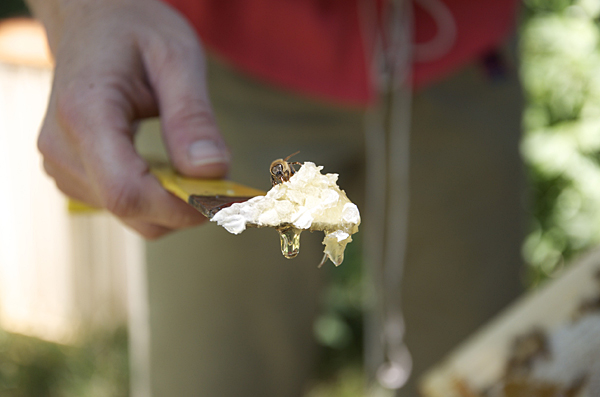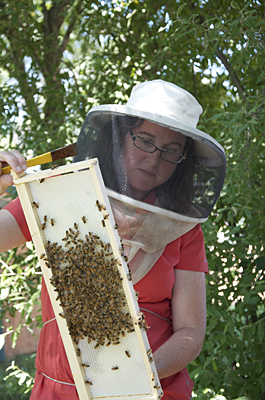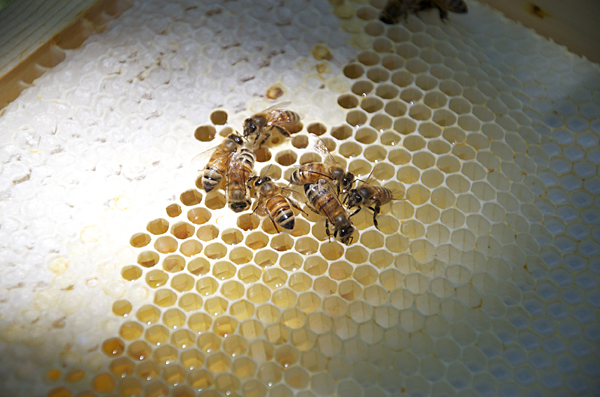


National Pollinator Week
University researcher spreads the buzz about bees, other pollinators
8:03 a.m., June 21, 2011--Debbie Delaney looked like she was feeling the heat on a recent 95-degree day at the University of Delaware apiary, despite the shade of black walnut and tulip poplar trees. It was hard to tell how the 22 hives of honeybees – some two million bees in all – were handling the steamy weather.
But Delaney, an assistant professor of entomology and wildlife ecology in the College of Agricultural and Natural Resources, had no worries. “Bees are much better at thermoregulation than humans are,” says Delaney. “Honeybees maintain strict temperature control. The colony always stays between 89 and 92 degrees, ideal for a honeybee, and the humidity never varies more than 5 percent. Worker bees flap their wings to cool the air and some periodically leave the hive to reduce the effects of body heat.”
Research Stories
Chronic wounds
Prof. Heck's legacy
Delaney has been researching bees for years but continues to be amazed at their abilities, including staying comfortable in the heat while we wilt. She’d like to see bees get a bit more respect -- if not the all-out enthusiasm she displays.
She’ll have an opportunity to spread the word about bees this week, which marks National Pollinator Week. The event recognizes not only bees but all pollinators – birds, butterflies, bats and beetles. One in every three bites of food humans consume has been made possible by one of these pollinators.
Pollinator Partnership, a nonprofit organization that sponsors the week, calls bees the primary pollinator of most plants. Delaney agrees, with a slight qualification.
“Bees are definitely the most important pollinator in our state in terms of the numbers and the importance of the crops they pollinate,” she says. “But bats also are important in a different way. Bat-pollinated flowers generally open at night and have distinct floral tube sizes and shapes that can accommodate bats. So bats are very important pollinators for a certain subset of plants.”
Even while giving bats their due, Delaney rattles off the Delaware crops that bees do pollinate: apples, asparagus, blueberries, broccoli, cabbage, carrots, cantaloupe, cucumber, eggplant, honeydew melon, nectarines, peaches, pears, peppers, pumpkins, okra, onion, squash, strawberries, tomatoes and watermelon. She’s quite sure she has missed a few. After all, bees pollinate more than 90 crops in North America.
Non-native honeybees are responsible for some of this pollination. But Delaware’s native bees deserve credit, too.
There are at least 200 native bees in the state, according to the state Department of Agriculture, which recently completed a five-year study of native bees. “Recent research has shown that native bees can play a major role in pollinating agricultural crops,” notes Delaney. “Native bees often will visit flowers in wet or cold weather when honeybees don’t want to come out of their hives. And farmers who use managed honeybees will see increased yields when native bees interact with the crops.”
Wild honeybees – descendants of honeybees introduced by European colonists – also play a role in agricultural pollination. Research on these feral bees may even help combat colony collapse disorder, a poorly understood syndrome that can wipe out entire hives of managed honeybees.
The Feral Bee Project, sponsored by North Carolina State University, asks beekeepers and “citizen scientists” to log the location of wild honeybee hives at the Save the Hives website.
“Colony collapse disorder in domestic honeybees continues to be a major concern,” says Delaney. “We still don’t know the cause or causes of this syndrome. But the Feral Bee Project may give us a better understanding of the role that natural resistance plays in fighting disease or environmental stress, as well as a better understanding of genetic components that contribute to ‘survivor stock.’”
Learn more
To find out more about pollinators and National Pollinator Week, go to the Pollinator Partnership website.
The Brandywine Zoo will be hosting “Pollinator Power” on June 25, a family friendly event from 10 a.m. to 4 p.m.
Article by Margo McDonough
Photos by Danielle Quigley










